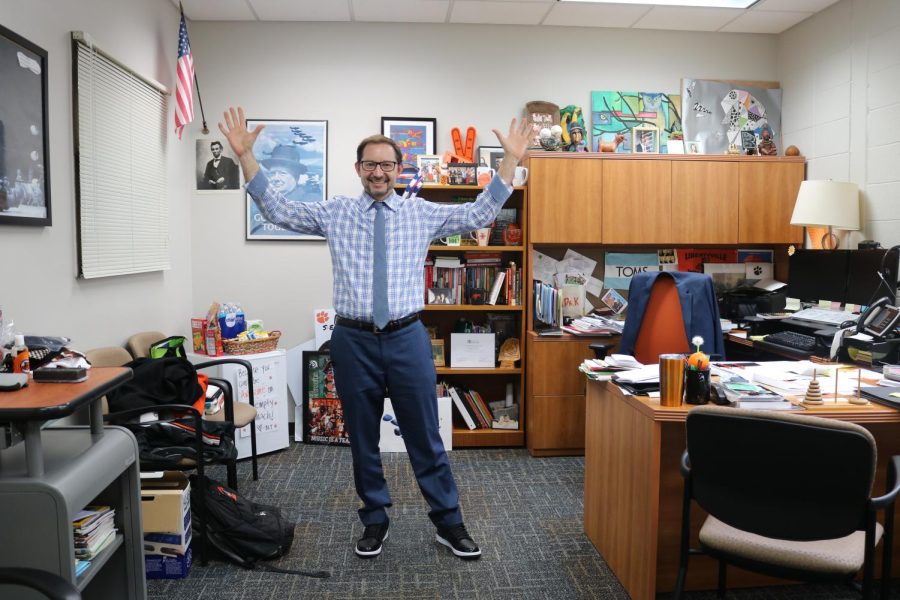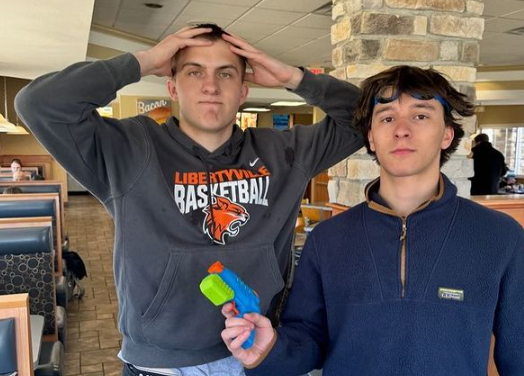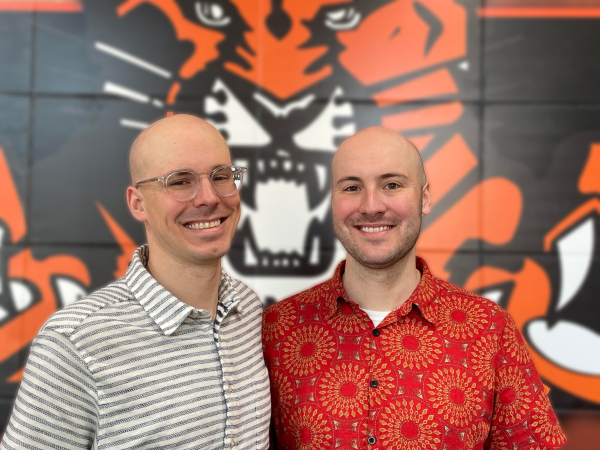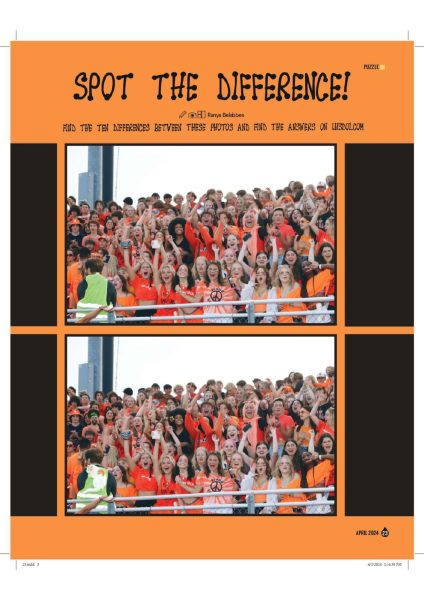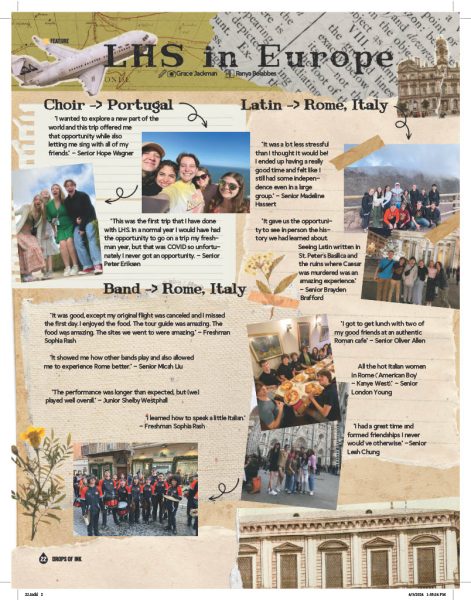Dr. Koulentes: The king of compromise
Principal Dr. Tom Koulentes (Dr. K.) presents a wholesome disposition and a welcoming smile. Although the role of being a principal is without a doubt hectic and stressful, Dr. K. puts forth immense effort to make LHS the best it can possibly be.
It’s not easy being the principal, especially in an environment where divisiveness is all around us. Conflict comes at every corner and it seems like no one can agree on anything anymore. How does Dr. Tom Koulentes, the principal of LHS, deal with today’s divisive climate and help opposing sides find a middle ground?
“My first job is to listen,” he explained. “Sometimes it might only be two sides, but sometimes there could be three or four sides of a problem. My job is to listen as much as I can to the concerns of whatever group or individual has those concerns.”
The DARING mission that was laid out by the district along with any rules and regulations play a factor in Dr. Koulentes’ decisions.
“What are the core values and mission of the school? What are the rules and regulations that schools have to follow? And what is ultimately something that is to the benefit of the whole?” he said.
As the principal, Dr. Koulentes struggles with opposition from all sides of the school, from both students and faculty.
“The only way that, I believe, you, as a principal, maintain a community’s trust is if you continue to make sure the process of those decisions is clear, and you continue to allow people to have a voice,” Dr. Koulentes explained.
Not only does Dr. Koulentes have to make a lot of tough decisions, he knows that every decision will be scrutinized.
“I have to be aware that there’s going to be disagreements about school policies, school rules, and my own personal decisions that I make towards that. That’s part of the job and leadership in general,” Dr. Koulentes explained.
Students are the priority in his decision making, as they are the ones that will be directly impacted by the decisions made by administration, but it can be difficult balancing opinions since parents and community members will also be indirectly impacted by the decisions.
“[I] ultimately make a decision that I believe is in the best interest of the majority of our students,” Dr. Koulentes said. “ I always try to make decisions that are best for students. And then right after that is staff and community. But it can be a challenge sometimes. Because sometimes what’s best for [some] students might not be best for all students.”
Dr. Koulentes pointed out differences between working with students and working with adults and community members to find compromise.
“I find high school students tend to be more open to that process than adults. Students are often willing to come and talk, listen to one another, and compromise. It’s harder for me to bring compromise to adult constituents than it is to student constituents,” Dr. Koulentes said.
One event that was especially challenging for the LHS community and Dr. Koulentes’ career was the debate amongst students and staff over the Illinois mask mandate after Judge Griscow’s order. Dr. Koulentes was hit with many arguments of differing priorities in the issue, but he was widely praised for his ability to strive for compromise in this challenging situation of divisiveness.
“There’s clearly some students who believe we need to continue to wear masks for health reasons,” Dr. Koulentes explained. “And other students are saying, ‘Hey, I would like to not have to wear it for my health reasons’. Making decisions when there are good arguments on both sides is when [my] job is the most complicated.”
Weighing differing priorities is important to Dr. Koulentes, as not one decision can best meet the needs of everyone in the LHS community. This is why listening is key to his decisions.
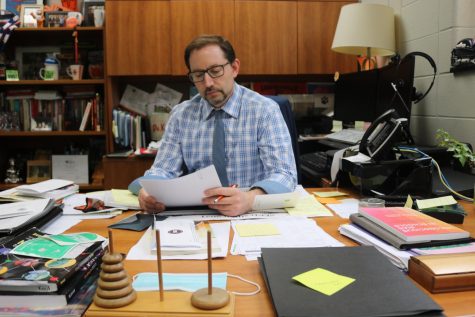
“I didn’t know what the right answer was but I knew that there were really passionate people on both sides of the argument, and I knew what our school rules were,” he said. “So I never wanted our students or our parents who thought that masks should be recommended and optional to feel like they were bad people and to feel like they were hurting others.”
The lifting of the mask mandate wasn’t the only hard decision for Dr. Koulentes. He was faced with decisions regarding the Parkland shooting walk-outs in 2018, and two opinions on the matter. One was advocating for gun control, and the other was advocating for their 2nd amendment rights. In the end, Dr. Koulentes decided to allow two separate walk-outs, one for each opinion.
“It was a way for me to show compromise, that not one side was right and another was wrong. Both ideas are important in a democracy, and that we need to listen to each other,” he said.
One of the more ongoing debates throughout his time as principal was debates around who was allowed to park on-campus and who was allowed to leave for open campus lunch. This was mostly solved by the creation of the Brainerd parking lot and the LHS allowing all students to leave for lunch because of Covid-19 restrictions. However, it is unclear if open campus lunch for all grade levels will remain in the 2022-23 school year.
In a public school setting, students interact with students different from themselves every day. How we respond to those differences is crucial to understanding others and to developing our sense of identity.
“I think one of the big things that you learn as a student going to a public school is that you’re here with all different types of students,” Dr. Koulentes explained. Different backgrounds and experiences and income levels, linguistic backgrounds, ethnic backgrounds, racial backgrounds, and religious backgrounds.” That being said, there are benefits of early connection between students who may not share the same views or perspectives.
“[Being a student in a public school] immerses you in situations where people might experience and see the world differently than you,” said Dr. Koulentes.
Learning experiences, such as setting aside what you know and believe in order to find a common ground is a vital skill.
“Changing [rules] at public schools is no easier and no harder than changing the world,” Dr. Koulentes said. “Because public schools are a reflection of the larger world.”
LHS continues to encourage and teach conflict resolution skills by incorporating the DARING method into everyday teaching as well as providing a variety of clubs for students to feel heard and accepted. The importance of clubs when it comes to spreading ideas is imperative.
“We want students to think: ‘How can our club also help other people understand why we’re interested in this and understand what we’re passionate about?’” Dr. Koulentes said.
During conflict, Dr. Koulentes’ primary method is using the “both, and” way of thinking. When coming to a compromise, many often find themselves thinking in the “either, or” state of mind. The “both, and” method shows appreciation towards all parties involved by acknowledging their input: both “this” and “that.”
Dr. Koulentes sets an example for LHS students and staff in regards to hearing every side. Listening is crucial when it comes to understanding one another and eventually achieving compromise.
“As a principal, I can never promise a community of parents, a student, a teacher, that I can make them happy with my decision. But what I can promise is that we will always have a process that is in place where people’s ideas and opinions can be heard.”



